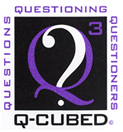The Curriculum on Medical Ignorance/Q-cubed Collaboratory K-12 Curriculum / Dissemination grant is a five-year award that began in Fall 2000. This program will develop, adapt, and evaluate, a K-12 version of the University of Arizona's Curriculum on Medical Ignorance (CMI), an innovative, multi-media approach that stimulates inquiry-based learning by questioning the unknown and searching for the answers. Students, K-12 science teachers, and doctoral scientists--to include many from disadvantaged, ethnic, minority, and indigenous groups--will be exposed to "the thinking, doing and teaching of science" in clinical medicine, underlying basic biology, and overlying public health, largely in the Arizona Health Sciences Center's specialized Centers of Excellence.
The evolving CMI-Q-cubed Collaboratory, a critical part of the dissemination effort, will link a core group of physicians, biomedical scientists and other researchers to Arizona-wide school districts and programs, national professional organizations and an array of other programs, products and people. An essential goal is to use the collaboratory to empower K-12 student/teacher leaders through showcasing their accomplishments and assisting career development.
The National Center for Research Resources Division of Clinical Research supports the SEPA awards to "improve life science literacy throughout the Nation. These grants bring together biomedical and behavioral researchers, educators, community groups, and other interested organizations in partnerships to create and disseminate programs that give K-12 students and teachers and the general public a better understanding of life sciences."
To learn more about NIH High School Student Program, please click on the links below:

